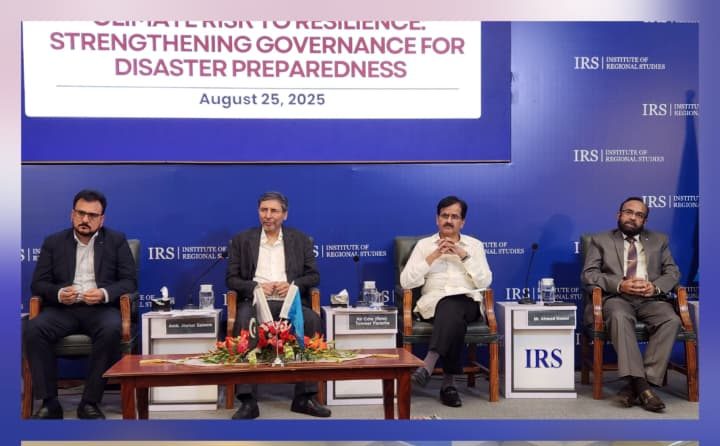ISLAMABAD ( WNAM REPORT ): The Institute of Regional Studies (IRS), Islamabad hosted a high-level dialogue on ‘Climate Risk to Resilience: Strengthening Governance for Disaster Preparedness’. The event gathered policymakers, experts, and practitioners to deliberate on the governance challenges of disaster preparedness in Pakistan amid escalating climate risks.
In his welcome remarks, Ambassador Jauhar Saleem, President of IRS, stressed that building resilience is not merely a financial or technical challenge but fundamentally a governance challenge that demands coordinated action, effective planning, and institutional strengthening. Recalling the devastating floods of 2022 that caused over US$30 billion in damages and displaced more than 33 million people, he underscored the urgency of embedding disaster preparedness into national and local governance frameworks. He further noted that recurring flash floods and urban flooding in recent years illustrate the escalating cost of inaction.
Former Chairman of the Federal Flood Commission, Mr. Ahmed Kamal, provided a historical overview of Pakistan’s flood management, noting that the country has faced 29 major floods since 1955, with the 2010 floods termed a “super flood” that affected 20 million people. He observed a troubling shift in the frequency and intensity of floods ranging from riverine floods to urban flooding. Stressing the importance of improved monitoring, he called for province-specific forecasting systems and a nationwide telemetry network to provide real-time data and early warnings tailored to diverse regional contexts. Mr. Kamal remarked on the necessity of both structural interventions and robust governance measures, including enacting Provincial River Acts, utilizing floodplain maps, and replicating successful urban early warning systems. He advocated for strengthening the Federal Flood Commission into a dedicated national authority, increasing funding for emergent flood programs, and launching large-scale forestation in river catchments to mitigate climate impacts and reduce flood intensity. Mr. Kamal emphasized a smooth coordination among federal and provincial institutions and a strong local government system for disaster preparedness.
Dr. Syed Faisal Saeed, Chief Meteorologist at the Pakistan Meteorological Department (PMD), explained the impact of intensifying monsoon trends and rising temperatures, particularly in Gilgit-Baltistan, which has witnessed a mean temperature rise of 6°C this year. He cautioned that these changes are accelerating glacial melt and increasing the risk of glacial lake outburst floods (GLOFs). Dr. Faisal indicated that the cloudbursts being attributed as cause of recent floods is inaccurate and that only one incident of cloud burst occurred in the country. While mentioning the well-established weather forecasting system of PMD, he indicated about the limitation of weather stations in glacial region due to inaccessibility and immense financial requirements. Highlighting the unpredictability of precipitation amid climate change, he pointed to critical technological and institutional gaps for disaster preparedness.
Dr. Muhammad Irfan Khan, an Environmental Expert affiliated with UNDP, UNEP, and FAO, discussed the ‘missing link’ of environmental governance in urban disaster preparedness. He identified overlapping institutional mandates, weak enforcement of building and zoning laws, outdated master plans, and the lack of integration of disaster risk reduction into urban development as major governance failures. Dr. Irfan highlighted violations of environmental regulations for urban planning which is the root cause of consequent environmental consequences including urban flooding. He highlighted governance failure citing non-functioning of Pakistan Environmental Protection Council (PEPC) and weakening of environmental/climate institutions. Proposing a multi-layered governance framework from strategic and regulatory to operational and financial, he advocated for institutional reforms, stronger coordination between municipal and development authorities, proactive climate-sensitive planning, and greater community participation to build urban resilience.
The dialogue concluded with an interactive discussion among participants and experts. In his closing remarks, Ambassador Jauhar Saleem reaffirmed that disaster preparedness is central to Pakistan’s sustainable future. He emphasized that the IRS will continue to serve as a platform for policy dialogue, research, and collaboration, aimed at strengthening governance and advancing climate resilience in the country.
46


